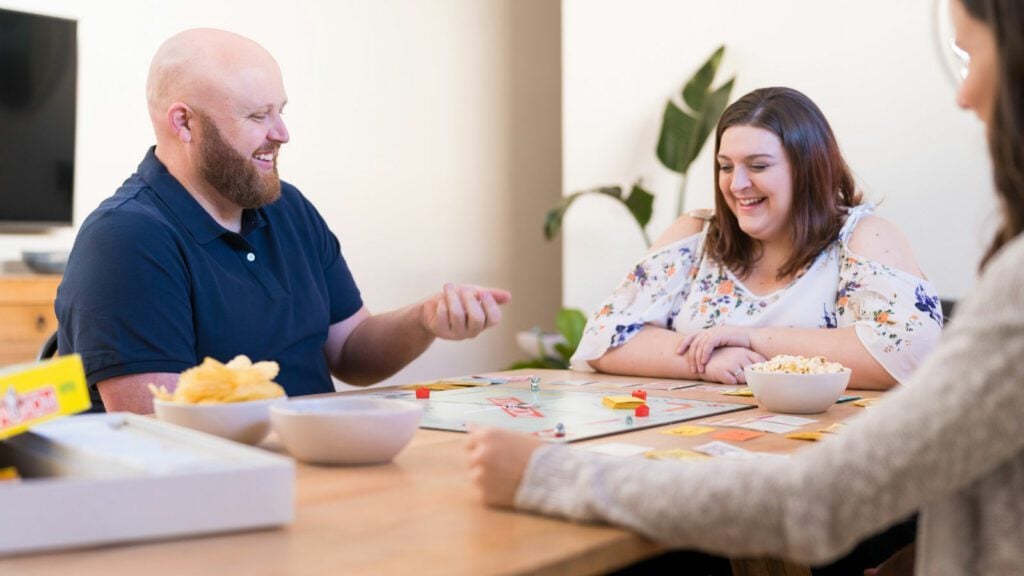How to get out of debt and save
When you’re finding yourself dealing with money problems and not knowing how to cope, sitting down and planning out debt management plans with the assistance of a budget should be high on your list of priorities.
We follow the journey of Sydney couple Megan and Creagh and reflect on just how quickly their financial outlook turned around. They went from desperately dealing with money problems to living their dream life in 12 short months. We taught them how to get out of debt and save, and you can do it too.

Dealing with money problems
The first step to dealing with money problems is to break the debt cycle and stop relying on credit cards and buy now pay later options. Many people say that financial stress feels inescapable, and working out how to let go of financial stress is even harder.
Tangled in a maze of bills and monthly repayments, it’s hard to move in any direction, even if you have extra money as you may not know where to start. Long-term goals, such as owning a home or starting a family, can feel like pipedreams without a debt management plan that allows you to make extra payments and get ahead.
This is where Megan and Creagh’s journey began. Despite having good jobs, the couple, both in their 30s, had amassed nearly six-figures of debt and were ineffectively dealing with money problems, not knowing where to start with their debt payments and struggling with any unexpected expenses that may have come up along the way. Most of their financial difficulties came from credit card debt due to overspending on the little things.
“It wasn’t big lavish expenses that got us into trouble, it was day to day stuff,” Creagh says. “With the credit cards, it was just like ‘oh well, pay it off later’, and it was always later.” Creagh continues, “It was easy to roll one credit card into another – it was a never-ending cycle and we needed to break that cycle.”
How to cope with financial problems
When you’re trying to cope with financial problems and you feel like you’re getting nowhere, it’s time to try something new. In order to break an unmanageable debt cycle before you’re overrun with credit card bills, late payments and impending calls from debt collectors, it can be easy to feel helpless. Many get so backed up with credit card debt, payday loans and lines of credit, coasting through on just the minimum payment, that it can easily spiral out of control before you realise it.
Megan and Creagh tried to get themselves out of their debt spiral with zero-interest credit card balance transfers, only to find that it backfired. They ended up with more cards and more unsecured debt, and didn’t know how to cope with money problems that felt never-ending. “I wanted to go forward, but I felt like we were standing still,” says Megan.
For Megan, trying something new was calling MyBudget.
She booked a free appointment for her and Creagh to get their unmanageable debt under control. Eleanor was the MyBudget money expert they met with to learn how to get out of debt and save for their financial goals.
Eleanor says, “The first thing I assured Megan and Creagh on was that it doesn’t matter what your starting point is. I’ve come across financial situations that are more complicated, and I’ve never seen a problem that can’t be fixed. It’s all about coming up with a plan and the sooner you start, the better.”
And that’s exactly what they did. Eleanor helped Megan and Creagh create a detailed personalised budget by going through all of their unsecured debts and living expenses in simple steps.
“To create a budget plan that actually works, you need to map out all your expenses and monthly income for the next 12 months,” explains Eleanor. “And I mean everything. In addition to all your debts and recurring monthly expenses, you’ve also got to include the bills that only come up once a year, like insurances, car registrations and Christmas. You’ve also need to set money aside with an emergency fund for unwanted surprises, like vet bills or car repairs.”
How to let go of financial stress
In order to let go of financial stress, it’s important to put a plan in place in the form of a budget. This allows you to easily foresee where your money is going, how long it would take you to pay off your debt, and where you can allocate any extra cash to get ahead.
“Once we had everything in the budget, Megan and Creagh had a detailed picture of where all their money was going,” says Eleanor. “It was that light bulb moment where they finally had a proper picture of their finances. Megan and Creagh didn’t need our help talking to their creditors, but that’s something we often do for people. We’re often able to suggest weekly and/or monthly payment arrangements that are more affordable, which can help someone who has a lot of commitments. It gives them time to pay their way out of personal debt without needing new personal loans or credit.”
Is it hard to live on a budget?
Some people may find budgeting to be restricting at first, but once you’re able to better manage your finances, it can open up plenty of possibilities.
Megan answers, “We still have the option to go out to concerts and comedy gigs and go out to dinner … MyBudget are so helpful and they know what they’re doing.”
Eleanor puts it this way: “The main change is that Megan and Creagh use their money more effectively. As well as having a budget in place, all of their bills and monthly payment plans are now automated. Their steady income is organised into streams, so there are no surprises, and they have a whole team of experts doing the work that keeps their budget on track.”
How to get out of debt and save
To get out of debt and save, the most efficient way is to implement a complete transformation in money spending habits. Looking for areas where you can reduce your expenses, such as eating out less or cancelling unnecessary subscriptions, can save hundreds, if not thousands in a year. By doing so, you may find that you had more money than you initially thought, allowing you to live a much more fulfilling life with healthier spending habits, whilst feeling less anxiety about not having an emergency fund for any potential unexpected emergencies.
In one year, Megan and Creagh emerged from a winter of unsecured debt into the financial spring of their dreams. They’ve paid off five credit cards in 10 months (about $60,000) and the idea of saving for a house is no longer out of reach.
Megan says, “We’re getting our paperwork together to begin the loan process for a house, so we’re starting to go to open houses and look online. It’s something I didn’t think would ever happen before MyBudget and now it’s here and it’s such an amazing feeling to have all that hard work pay off.”

Creagh follows up, “MyBudget has been the best decision we’ve ever made. A weight is lifted off our shoulders. The one regret I have is that I didn’t ask sooner. It has literally changed our lives.”
But is it really possible to transform your finances and life in such a short period of time and learn how to cope with money problems like Megan and Creagh did? “It’s absolutely possible,” says Megan. “Each week, as we watched our bills getting paid and those savings start to build, it’s an incentive to keep going, to keep sticking with the budget because that’s going to lead to that end debt repayment goal. Truly, asking for help was the best step.”
Once you have your budget set up, you can follow various debt repayment strategies, paying more than the minimum payment with any extra money in your finances. With various debt management plans, which includes both the debt avalanche method which looks to pay off high-interest debts first, and the debt snowball method that involves focusing on the current debts with the lowest balance first, you can perhaps avoid other methods that may prolong your loan term, such as debt consolidation loans.
If you’re struggling to formulate the right debt repayment strategy and need help getting on top of your monthly bills, MyBudget has helped over 130,000 Australians live their lives free from money worries. To contact us, enquire online or give our friendly staff a call on 1300 300 922.
